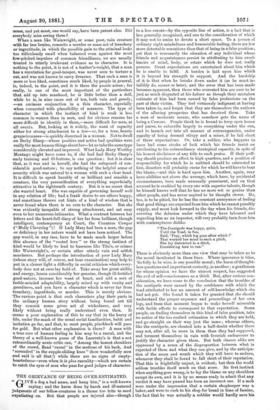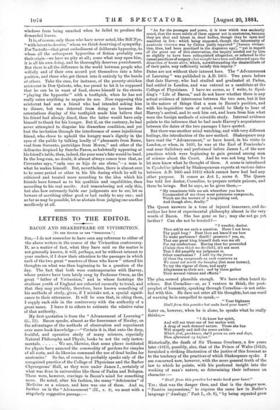THE GRIEVANCE OF BEING OVER-ESTIMATED. 4 6 Ci_IVE a dog
a bad name, and hang him," is a well-known saying ; and the harm done by harsh and ill-natured judgments of our fellow-creatures is a theme too trite to need expatiating on. But that people are injured also—though
to a less extent—by the opposite line of action, is a fact that is less generally recognised, and one to the consideration of which it may not be amiss to devote a short space. To a person of ordinary right-mindedness and honourable feeling, there are few more detestable sensations than that of being in a false position ; yet that is necessarily the situation of any individual whose friends and acquaintances persist in attributing to him excel- lencies of mind, body, or estate which he does not really possess. Great expectations are entertained about him which he is unable to fulfil. A burden is laid upon him which
it is beyond his strength to support. And the hardship of it is that when he breaks down under it (as he mast in- fallibly do, sooner or later), and the error that has been made becomes apparent, then those who overrated him are sore to be just as much disgusted at his failure as though their mistaken
estimate of him had been caused by false professions on the part of their victim. They feel virtuously indignant at having been taken in, and forget that they are themselves the authors of the alluring prospectus that has deceived them. Take a man of moderate means, who somehow gets the name of being a Crcesus. People think he is bound to keep open house and purse, to subscribe largely to everything under the sun, and to launch out into all manner of extravagancies, under penalty of being deemed stingy and a miser, if he fall short of these expectations. Or, take a soldier, who happens to have had some stroke of luck which his friends insist on attributing to his extraordinary strategical capacity, in spite of his honest disclaimer of any title to such praise. If their puff- ing should produce an effect in high quarters, and a position of responsibility for which he is unfitted should be entrusted to him, disasters will probably ensue for which he will have to bear the blame,—and this is hard upon him. Another, again, may have abilities not above the average, which have, by accidental circumstances, been made unusually prominent, and on that account he is credited by every one with superior talents, though he himself knows well that he has no more wit or genius than other people, and has never aspired to be thought clever. He, too, is to be pitied, for he has the constant annoyance of feeling that good things are expected from him which he cannot possibly supply, and must look forward to the day when his friends, dis- covering the delusion under which they have laboured and regarding him as an impostor, will very probably turn from him with contemptuous dislike.
"The Centipede was happy, quite, Until the Toad, in fun, Said, 'Pray, which leg goes after which ?'
That worked her mind to such a pitch, She lay distracted in a ditch, Considering how to run."
There is obviously more than one view that may be taken as to the moral inculcated in these lines. Where ignorance is bliss, 'tis folly to be wise, is one possible moral ; the harm of thought- less questions and impertinent curiosity, is another ; a gentleman for whose opinion we have the utmost respect, has suggested the evil of self-consciousness as a third. But, after serious con- sideration, we have come to the conclusion that the troubles of the centipede were caused by the confidence with which the toad attributed to her an amount of self-knowledge which she had not got. She found it taken for granted that she should understand the proper sequence and proceedings of her own legs, and from that moment began to make herself miserable
with feeble efforts to correspond to that expectation. Some people, on finding themselves in this kind of false position, take no notice of the too exalted estimation in which they are held, and go straight on their way just the same ; whereas others, like the centipede, are cheated into a half-doubt whether there
may not, after all, be more in them than they had supposed, and torment themselves in vain with feverish endeavours to justify the character given them. But both classes alike are oppressed by a sense of the disproportion between what is expected of them and what they can give, and by the anticipa- tion of the scorn and wrath which they will have to endure, whenever they shall be found to fall short of their reputation.
That this is frightfully unjust, is evident; but then the world seldom troubles itself much on that score. Its first instinct when anything goes wrong, is to lay the blame on any shoulders
except its own, and it is by no means ready to admit that any verdict it may have passed has been an incorrect one. If a mob were under the impression that a certain shopkeeper was a baker, and were to rush to his shop for bread in time of famine, the fact that he was actually a cobbler would hardly save his
windows from being smashed when he failed to produce the demanded loaves.
It is, of course, only those who have never acted, like Bill Nye, "with intent to deceive," whom we think deserving of sympathy. For Tartuffe—that great embodiment of deliberate hypocrisy, to whom all the subsequent hypocrites of fiction probably owe their origin—we have no pity at all; come what may upon him, it is all his own doing, and he thoroughly deserves punishment. Bat there is all the difference in the world between people who wilfully and of their own accord put themselves into a false position, and those who get thrust into it entirely by the hands of others. Take the case, for instance, of the poverty-stricken aristocrat in Don Quixote, who, too proud to let it be supposed that he can be in want of food, shows himself in the streets 'playing the hypocrite" with a toothpick, when he has not really eaten anything to require its use. Now supposing this aristocrat had met a friend who had intended asking him to dinner, but was deterred from doing so because the ostentatious display of the toothpick made him believe that his friend had already dined, then the latter would have only himself to thank for his hunger. But if, on the contrary, he had never attempted to disguise his dinnerless condition, and yet lost the invitation through the interference of some injudicious friend, who chose to uphold the hungry man's dignity in the eyes of the public by talking loudly of "pheasants from Rome, veal from Sorrento, partridges from Moron," and other of the delicacies despised by Sancho Panza, as habitually appearing at his friend's table, then, indeed, the poor man's fate would be hard. In the long-run, no doubt, it almost always comes true that, as Cervantes says, " cada uno es hijo de sus obras,"—a man is what he makes himself. But, nevertheless, there is almost sure to be some period or other in his life during which he will be criticised and treated more according to the idea which his friends have formed as to his qualities and capabilities, than according to his real merits. And remembering not only this, but also how extremely liable our judgments are to err, let us beware of ascribing either good or bad rashly to any one ; and as far as may be possible, let us abstain from judging one another needlessly at all.































 Previous page
Previous page